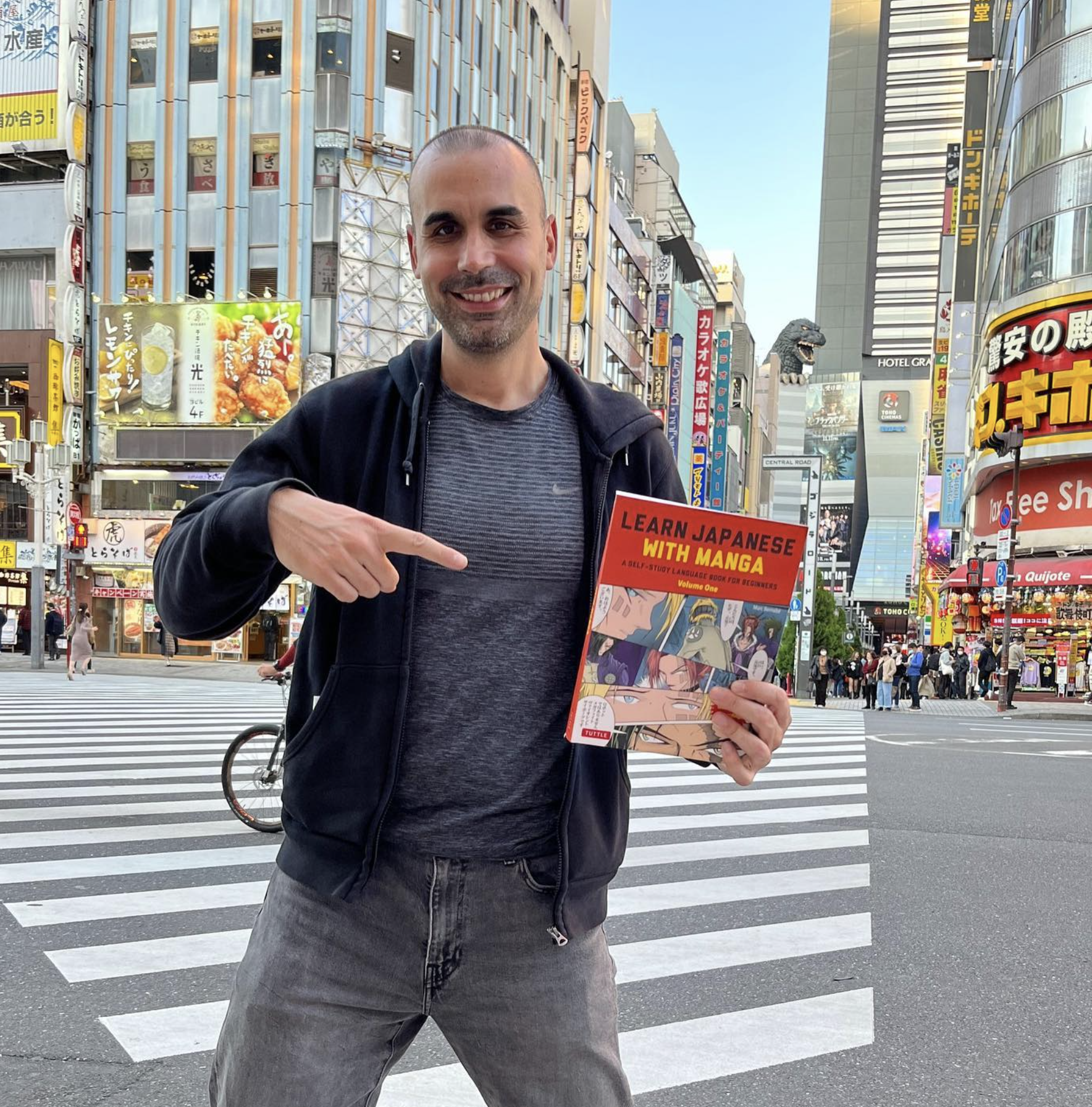One of our favorite releases of the past year was actually the second book in a two-volume series: Learn Japanese With Manga! by Marc Bernabe. We wanted to revisit these books by interviewing their amazing author. You can see a video version of this interview here (or at the bottom of the article), and pick up these and other Tuttle Language titles here!
Congratulations on the release of both Volumes of Learn Japanese With Manga! Tell us a bit about your journey of learning Japanese and then wanting to teach others, especially in book form.
Thank you so much! First of all, let me introduce myself. My name is Marc Bernabe and I'm a professional translator of manga and anime mainly for the Spanish market in Spanish and Catalan, and I'm the author of the Learn Japanese with Manga series released by Tuttle. I'm very happy to do this interview and to have been given the chance to present these books, to tell you what they mean for me and how they can help you learn Japanese.
I started learning Japanese about 30 years ago in Barcelona, Spain. I was, and I still am, a big fan of manga and I have thousands of manga volumes at home. As a teenager, I loved to read manga and watch anime and I always had wanted to learn Japanese in order to understand these exciting books and shows in their original language. I eventually became a translator and now I win my bread thanks to my Japanese language learning experiences.
I always wanted to convey this passion to others, so I started writing a section about learning Japanese in an anime magazine. And what better way to learn Japanese if you like manga than to do it through these kinds of materials, right? This is why I created the Learn Japanese with Manga series. They have helped many Spanish speaking people (and also French, German, Italian, Portuguese and Catalan) learn Japanese. I'm very happy that the books are now getting an English language release.
Learning a language using manga is such an interesting concept! Can you speak to how manga as an art and literary form aids in language learning, especially as compared to more traditional methods?
Learning any language is always a very difficult task and I think one of the main points you have to keep in mind while doing it is to keep the motivation up. If you are not motivated, it will be really difficult to learn a language.
In the case of people who like manga, anime, and other forms of Japanese popular culture, I thought it was a very good way to use manga as a tool and an aid for learning. This is one of the main driving impulses that made me write these books: I wanted to offer a tool for people to really have fun while learning Japanese and help them keep the motivation up. This is very important and I think that with these books you can really do it.
What types of learners would most benefit from this manga approach?
I think you don't need to be a manga or anime fan to learn Japanese with the Learn Japanese With Manga series. Of course, if you already like manga, anime, and other forms of popular Japanese culture, then it is an obvious way to enter. But if you don't, it's not really a problem at all. The Learn Japanese With Manga books are aimed at anybody who has an interest in learning Japanese. It's quite an easy way to approach the language and to have fun while learning it.
This is very important because having fun while learning a language is essential. If you don't have fun, if it's very boring, then it can be really hard and difficult to keep the motivation up. I think these books are very helpful in this way as well.
What were the easiest and most difficult language lessons to turn into manga?
Actually, any matter can be challenging to teach using any certain tool. In this case I'm using manga, but I could just as well be using other resources such as anime or music or whatever.
All the lessons were difficult to express in a comprehensible and easy to understand way. In every lesson I try to explain a different part of the language, for example names, adjectives, verbs and so on. Every lesson has a central theme and I explain that theme thoroughly in the first pages. Then I use manga as examples to show how what we learned in the theory part of that lesson works actually in context. This is the method I’m using and I think it will be very helpful for many people. It certainly has with many people that have started learning Japanese thanks to this book in other languages such as Spanish or French.
Why do you think manga has become such a huge global phenomenon, and what important aspects of Japanese culture does it communicate?
I don't have a clear answer to why manga may have become such a global phenomenon, really. I think it might be because the stories they tell are very interesting to many kinds of readers. Young readers can find an interesting manga for them and adult readers can also find exciting stories for them.
Anybody can read manga and enjoy it, and there's a big market out there and there are many reading options, so I think this phenomenon deserves to be studied thoroughly. I don't have the right answer: it's just interesting, it's nice, it's exciting and that's the only thing I can manage to say in this short interview.
Of course, as a lot of manga are based in Japan and the action happens in Japan and many of the characters are Japanese, many Japanese situations will arise. People will remove their shoes when entering a house, they will eat their food with chopsticks, and they will do the hanami – the sakura cherry blossom viewing party – in April, and they will do many other Japanese things. We can see these situations in manga and we can learn Japanese culture through that, so it's a very interesting world to be in. I hope that with the Learn Japanese With Manga books you can also enter this fascinating world and learn a lot. Not only about the Japanese language, but also about Japanese culture and customs and way of life. It’s very interesting to learn about other cultures.
Learning a language can be a really long process, and I once heard someone compare learning Japanese to climbing Everest! Can you offer some guidance and encouragement to those who might be struggling to learn their target language, especially Japanese?
Yes, of course learning any language is hard, but as Westerners learning an Eastern language, Japanese is especially hard mainly because of the writing system. Because the writing system is so different, it's the hardest part of learning this language.
My guidance and encouragement would be to find your motivation. If you are not motivated enough to learn Japanese, then it's very difficult to continue learning the language. So try to find your motivation and cling to it. In my case, my motivation was my desire to read manga in Japanese, to watch anime in Japanese and to be able to communicate with Japanese people. So this is what kept me going while I learned the language: this was my driving impulse and I hope you can find yours. I actually think manga can be very much yours, so keep on! It's a good and proven way! Try and find your motivation, that's all.
What other books, audio, or resources can you recommend that have helped you in your language learning journey?
As I have told you before, I started learning Japanese about 30 years ago. I think the scene has changed a lot. Now you have several apps that are very useful, you have a lot of online resources and books. So my point of view could be very misleading nowadays.
Anyway, I have two recommendations of books that helped me a lot while I was learning the language. The first one is Remembering the Kanji by James W. Heisig. This is a very imaginative way to learn kanji.
And the second is a series of three books. The first one is called A Dictionary of Basic Japanese Grammar, and then you have the Intermediate and Advanced ones. These three books are really useful while learning the grammar. Why do they use this or that expression and in which context, for instance.
These would be my recommendations, but I'm an old-timer so I think you may know better than me. Maybe you know a lot of apps like Midori or other apps or online resources that can help you better than these books. What I can say is that these books were very meaningful for me when I started 30 years ago.
We really appreciate this conversation and your thoughtful answers! Do you have any upcoming projects that you can tease for us?
Yes, I actually have written a lot of books in Spanish about Japanese culture and Japanese way of life and so on. My latest book was released in Spain some months ago. It’s called Destino Japón (Destination Japan) and it's a travel guide. I wrote it with three other authors. It was very hard work to write this guidebook and I'm very proud of it.
I love Japanese manga and anime and all these kinds of things, but I also love traveling through Japan. It's one of my passions, and writing this guidebook and giving my impressions of what I like about Japan and what kind of places I recommend to go and what kind of food I recommend to eat and so on has been very meaningful for me. So I hope in the future this guidebook will be also released in English and I hope you can all use it to travel to Japan and enjoy the country as much as I do.
You can purchase Learn Japanese With Manga Volumes 1 & 2 right now:




